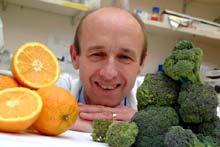Genetic clues for fighting inflammatory diseases with antioxidants

Professor Bob Grimble <br>University of Southampton
Southampton scientists are hoping to find out why some people benefit more than others from the effects of fruit and vegetables in battling conditions such as rheumatoid arthritis, inflammatory bowel disease, asthma and heart disease.
It is already known that a diet rich in fruit, vegetables, nuts and tea provides plenty of antioxidants such as vitamins E and C, beta-carotene and polyphenols. These help tackle an excess of free radicals and oxidants produced to help our immune system kill harmful microbes which try to invade our systems every day. The production of too many free radicals can end up damaging our bodies and needs to be controlled. This is one of the reasons why the Government has recommended we eat five helpings of fruit and vegetables each day. However, more work needs to be done to discover if genetic factors are important too.
Professor Bob Grimble is leading a team of scientists and clinicians from the Institute of Human Nutrition at the University of Southampton, the city’s University Hospitals Trust and Sciona Ltd investigating how our genes interact with antioxidants in our diet in changing inflammation. The group has won a £440,000 LINK award from the Biotechnology and Biological Sciences Research Council and Sciona Ltd and hopes to start work early in 2003.
Professor Grimble said: “Our genes influence the strength of our inflammatory response. But it is not yet known whether some people benefit more than others from an increase in dietary antioxidants.”
The two-year study will involve 400 volunteers, both healthy middle-aged men and patients with the early signs of rheumatoid arthritis.
Media Contact
All latest news from the category: Health and Medicine
This subject area encompasses research and studies in the field of human medicine.
Among the wide-ranging list of topics covered here are anesthesiology, anatomy, surgery, human genetics, hygiene and environmental medicine, internal medicine, neurology, pharmacology, physiology, urology and dental medicine.
Newest articles

First-of-its-kind study uses remote sensing to monitor plastic debris in rivers and lakes
Remote sensing creates a cost-effective solution to monitoring plastic pollution. A first-of-its-kind study from researchers at the University of Minnesota Twin Cities shows how remote sensing can help monitor and…

Laser-based artificial neuron mimics nerve cell functions at lightning speed
With a processing speed a billion times faster than nature, chip-based laser neuron could help advance AI tasks such as pattern recognition and sequence prediction. Researchers have developed a laser-based…

Optimising the processing of plastic waste
Just one look in the yellow bin reveals a colourful jumble of different types of plastic. However, the purer and more uniform plastic waste is, the easier it is to…



